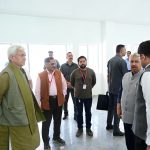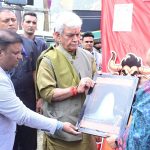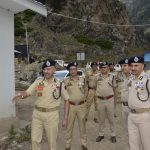SHEIKH SHABIR KULGAMI
The decline of reading activity in Jammu and Kashmir is on the rise which is unforgiving; and food for thought by all accounts. How else can society be seen uncivilized should this vital aspect of social life be loathed by it? The responsibility of educating people about reading/ writing is shouldered by educational institutions set up worldwide. But there is not much to celebrate in that as reading is rapidly losing potency and appeal in J&K ostensibly due to the allure of social media and the reading material (for an exam) recast as loose sheets up for grabs in the market. Since books, journals, newspapers, etc are a reservoir of rational ideals and enlightenment, reading them objectively, is bound to act as a passport to the shores of three P’s: Peace, Progress and Prosperity.
Reading finds a fresh perspective coming into being and broadens the outlook which transcends borders. A global citizen mindset is, therefore, shaped; undesirable thoughts are warded off on their own. That, above all, evaporates the fog of hate and malice; pulls down the caste and colour barriers; buries the cultural and regional superiority feelings and births noble and novel ideas in a person. It is the fragrance of such ideas that unites hearts, washing away the dirt of nefarious designs. Truth is, a gentle voice echoes with a universal appeal.
Reading books and other sources of information/ knowledge also expands the breadth of our knowledge. According to the ancient Greek philosophers, having knowledge is a virtue, suggesting that the lack of knowledge is an evil. We, therefore, conclude that reading is a fountainhead of knowledge. Also of wisdom and enlightenment.
To be a student in any educational institution is a privilege. A student learns from teachers, from the environment and most importantly from books and other media. With reading largely on the back burner among most students, the scale and scope of their knowledge, competence and success leaves much to be desired.
A good grade achiever may have brilliance. As an educator with about 16- years experience in school teaching—especially at the secondary and higher secondary level –this columnist has discovered tens of thousands of students with a remarkable performance in a particular exam. But their command over the contents/ subjects, which they have passed so well, remains under par.
These students cannot analyse, evaluate or explain the contents which they have committed to memory. Only the deep study of books rewards them with the power to figure out things and take on the challenges of life head on.
A good number of students harbor a thought that studying books, newspapers, etc is a wastage of time and energy and that memorizing easy notes alongside an extra help remain a productive path to deliver goods with ease in academics or in a competitive level exam.
This perception over the years has gained enormous ground courtesy of the success rate in exams, particularly in the academic exams whether at the school or university level, from the past many years has been amazing. Consequently, reading activity has lost attraction and — utility.
A high performing student/ candidate may have appreciable memory; awarding the crammed content, however, borders on miscarriage of justice. Should students/ candidates not be evaluated for their critical understanding of things? To reform the exam system in letter, spurring reading culture — a must-have part of social advancement and stability– is a key requirement.
What sows the seeds of indifference and apathy towards reading (with comprehension) is no or low priority on discussing and debating contents. Main focus is laid on presenting bombastic contents to grab attention. No debates and efforts are organized to test and train understanding, analytical and critical appreciation.
It is essential to prescribe the quantity of curriculum whose timely completion is possible . But not at the expense of reading, a stepping stone to comprehension. True, the amount of syllabi can be shortened to help the understanding of contents. Additionally, critical thinking and critical analysis of contents needs to be fostered.
For example, a student may be taught what rotation is. But why is rotation important? Similarly, a tomato is a fruit, not a vegetable. Why so? Such questions are not asked or discussed. As a result, students see little benefit in critically analyzing contents; studying text books goes on dwindling. That opens the door for rote learning, making it the safest and foolproof route to success with flying colours in examinations.
In addition, copying and cheating among pupils / candidates picks up alarmingly. In contrast, measuring students’ performance in terms of critical analysis of contents produces great scholars besides hard working and creative thinkers. Most importantly, teaching languages merely as sources of stories to be memorized rather than as treasures of wisdom and language acquisition is a stumbling block for in-depth study of reading thoroughly with understanding.
Granted that students do know grammar after a fashion but they badly miss the ability to critically examine content in light of their poor command over language. For a large number of students, writing or speaking anything in their own words remains an area of improvement. They look forward to their teachers to write a topic for them. And if the pupils present the topic, their poor language is reflected in their faulty pronunciation and speaking manner.
Unless, our students are freed from the prison of rote memorization and it’s awarding in terms of high grades, the interest and passion for the detailed study of reading sources like text books, newspapers, etc among them is hard to come by and sustain.
Teachers, administration and the exam conducting bodies can play a pivotal role in cultivating a reading habit among students and society at large. Looking the other way is myopic and ominous.
(Author is a teacher by profession and RK columnist. Feedback: [email protected])








